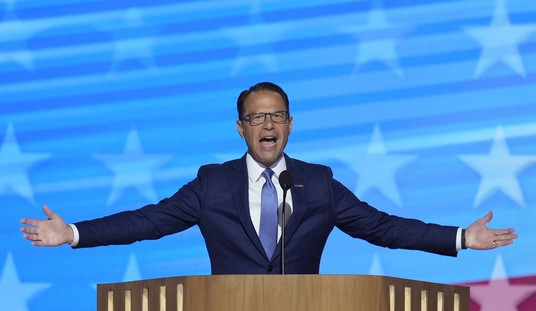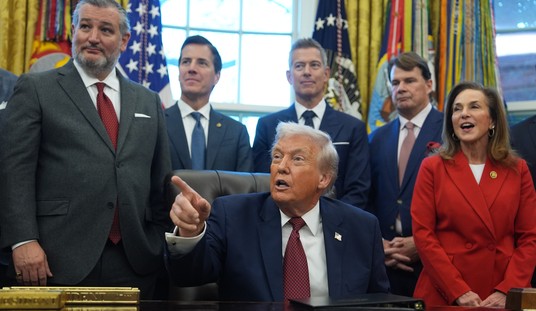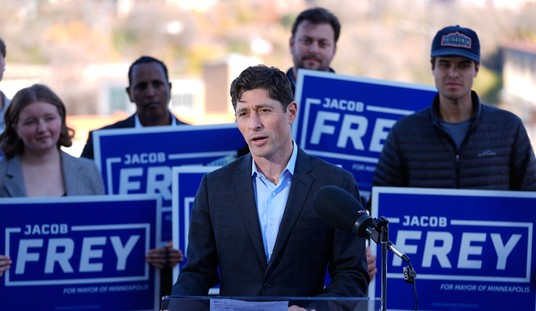7:30 p.m. ET, at the National Defense University in Washington, Professor O finally steps to the lectern. I’m kidding in the headline, of course; the point of this chat isn’t really to clarify what we’re doing in Libya but to check the “president addressing nation about new war” box and reassure war-weary voters that our “time-limited, scope-limited military action” really will be time-limited and scope-limited. A sneak preview from NBC:
One, he’ll announce that the one-week campaign (to establish a no-fly zone and to immobilize the Khaddafy’s army) has worked. Indeed, due to the Western airstrikes, rebel forces have the momentum and are now at the doorstep of Khaddafy’s home town. Two, the president will stress that the U.S. has handed over command and control to NATO. A senior administration official confirmed to NBC’s Courtney Kube yesterday that NATO has agreed to take over the mission to protect Libya’s civilian population. And three, he’ll discuss the lives that the campaign has saved. One other thing to note: The reason why the president is making his speech from the National Defense University and not from the Oval Office is that it’s more of a “policy” speech (which presidents typically deliver from different venues) than an “action” one (which they typically give from the Oval Office).
The rebels may have been at the “doorstep of Qaddafi’s home town” earlier, but within the past few hours they’ve fallen back after coming under heavy fire from regime loyalists in a nearby town. No matter, though. This isn’t a speech about the importance of victory and why we should bear any burden to achieve it. It’s a speech about how we’ve already kinda sorta achieved “victory” by preventing a massacre and that there’s really no burden to be borne at all. Whatever happens on the ground from here on out is gravy, so long as Qaddafi stays out of Benghazi.
What would this speech sound like if it was, honestly, about clarifying the mission? Well, for starters, The One would cop to the fact that, yes, we really are trying to achieve regime change. He can’t say that because it’s beyond the scope of the UN resolution, but realistically the only way now to guarantee the safety of Libyan civilians in the country’s rebellious eastern provinces is to get rid of Qaddafi. If he survives, he’ll take revenge on everyone. Ergo, he can’t survive. The next admission Obama would make is that … we don’t have a concrete plan for achieving regime change. The Brits have dropped a few bombs on Qaddafi’s compound in Tripoli, and we’re beaming in propaganda asking/begging Qaddafi’s soldiers to switch sides in order to hasten his overthrow, but beyond that there’s not much we can do directly. Indirectly, of course, we can continue to do what we’re doing now — bombing Qaddafi’s positions outside Sirte and, eventually, Tripoli in a transparent attempt to soften up his forces for a rebel advance on the ground. That too, however, is beyond the scope of the UN’s resolution — we’re supposed to be protecting civilians, not acting as the rebel air force — so O has to pretend that we’re still waging purely defensive war instead of an obviously offensive one.
Finally, he could offer real clarity on the purpose of this adventure. Yes, there’s a humanitarian component to it, but this piece by Jason Zengerle fills in the rest of the blanks:
With Libya, humanitarian hawks have found an almost too-good-to-be-true vehicle for this vision. In Qaddafi, the U.S. has an operatically villainous adversary who not only has the blood of Americans on his hands but also the blood of his own citizens, having pledged to Libyans who dare oppose him that his military “will find you in your closets.” From a purely Realpolitik perspective, Qaddafi also gives the U.S. a Muslim foe who—unlike even Saddam Hussein—is not particularly beloved by the Arab street, much less Arab leaders. Which explains why, unlike the war in Iraq, this military intervention is truly multilateral.
Then there’s the reality of this particular moment. There is no chance of the U.S. intervening militarily on behalf of the revolts in places like Bahrain or Yemen or Syria, where the U.S. either counts on the cooperation of its repressive leaders or fears the relative might of its armies. But Libya, with its isolated, intransigent dictator and ragtag military, presents no such difficulties. As such, it offers an ideal vehicle to signal to “those kids” (as an Obama aide, speaking to Politico, referred to Arab pro-democracy demonstrators) that the United States is on the right side of history.
He’s trying to buy goodwill to undo decades of U.S. support for the Mubaraks and Ben Alis of the world. If Libya were happening in a vacuum, without half a dozen other Arab countries teetering on the edge of revolution and power struggles involving anti-American lunatics, he might — might — have thought differently about intervening. As it is, he’s making an example of Qaddafi to show solidarity with young Arab populists and to send a thinly veiled message to newly ascendant demagogues in the region that he’s more willing to project military power than some might think. Still, though, never forget: Obama is, first and foremost, the Perpetual Campaigner, a guy willing to abdicate on issues of utmost national importance if doing so will increase his chances of reelection next year. That’s why I think this Libya mission is a one-off and why I’m not as worried as Mickey Kaus and Ross Douthat about the “routinization of humanitarian war.” It’s hard to imagine the Perpetual Campaigner, who ran as a progressive with impeccable anti-war (i.e. anti-Iraq) cred, testing the public’s war fatigue by intervening again and again overseas. (Support for this mission, while net positive, is still the lowest for any military intervention over the past 30 years.) He did it this time because he thought it’d be easy, because it would theoretically blunt Arab criticism about U.S. support for autocrats, because he had plenty of political cover from Europe, and because, let’s face it, Americans will be thrilled to see Qaddafi hanging from a lamppost. Is there any country for which all those things are true?
As we wait, go read Ed Driscoll’s post about Obama’s recent ode to internationalism. What does this mean, exactly: “[I]t is our military that is being volunteered by others to carry out missions that are important not only to us, but are important internationally.”







Join the conversation as a VIP Member